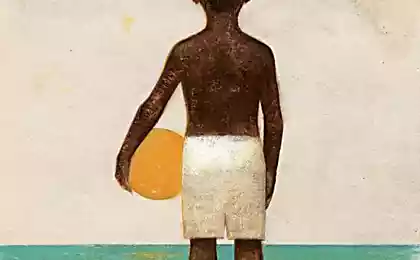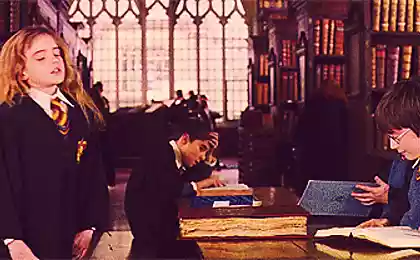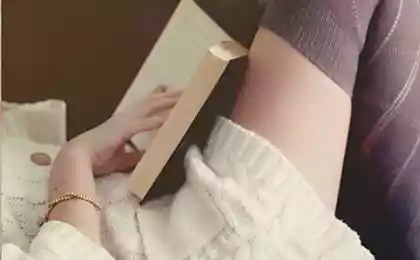1163
Murder and zhivodёrstvo in children's literature
Hair separated from the skin, and teeth
knocking fractional knock mouth ...
L. Charskaya. White cape, Ch. XIX
- No! - Said the boy.
- Though you with an ax, but I'm not afraid of you ...
Chukovski. Dr. Aibolit
First, you need an explanation: for children's literature is meant here is not only literature art, it may be folk tales, children and okolodetsky folklore, textbooks, biographies of famous people, in short, everything that seemed suitable to illustrate the title. Sometimes it's even things not for children, but only visited the children - for example, spy books 30- 50s. The mosaic nature of statements and their disorderly arrangement only say that the author of this article does not care about the scientific approach and any moralizing calculations, the main for him care - is to entertain the reader. I'll start, perhaps, from the depths of the dense jungle folk tales with Verlioki and One-Eye Lehigh these Russian relatives famous Greek Cyclops.
Everyone was Verlioka good - and hooked nose and his head erect, and his mustache in polarshina and color bristle, and on one leg - a wooden boot. The only bad thing: by nature he was too weak - both envy where the person who does not restrain himself and the will beat. And so it was with his granddaughter, an orphan, who sent my grandfather to protect the field peas. I saw her Verlioka immediately and killed a crutch. And then sister killed her, followed by sister and grandmother. Comes grandfather for peas, looks: are his beloved granddaughter - just asleep; Only the blood of one, a purple ribbon on his forehead visible, and the other on a white neck five blue fingers ottisnulis. And the old woman so mutilated that know you can not. With dashing the One-eyed things turned even bloodier.
Here poslushayte.Odin blacksmith of boredom and a good life went to look dashing. Or, as they say, for adventure on his head. On the track, he, as usual, a good drink in comrades took myself a tailor, and together they turned the forest. Suddenly see: in the forest hut - bad such a hut, empty; they sat down to myself and wait, and then wait - and do not know. Well, wait - is included in the hut a woman, tall, thin, with one eye, rubbing his hands and says, well done, says complained to me now than dinner. Those, of course, scared, and famously went into the woods, brought firewood, lit the stove, stabbed poor tailor, put the body in the stove, fried and dinner human flesh. Smith was the guy does not miss, the cunning of his eaten friend. He promised villain forge new eyes, instead of the absent, and he took an awl, glowed with fire, guided by eye healthy, took an ax da butt and vdaril of sila. Then almost exactly repeats the story of Odysseus and sheep: dressed in sheep's clothing, a blacksmith is selected from the hut. But this dangerous adventure does not end. There is a blacksmith on the forest path and sees the tree ax with a gold handle. He took over the ax, the arm to him and stuck. A dashing one-eyed right there. Then Smith took out his knife and let his hand cut - sawed off her and left. What is most striking in folk tales, so is the simplicity and ordinariness accompanying bloody scenes. The naivete with which they are described, bordered by some kind of childlike innocence peculiar to primitive peoples. Here's a story about eaten Chinese recorded in the beginning of the century Papuan tribe Marinda-Anime: We were in the village was one Chinese. It was a very bad man, crocodile, anemia and abuser of women. He threatened us his gun and said: "If you do not give me enough coconuts, I all of you shoot." We brought him as much as he wanted. Chinese happy and truly thought he could take us all that we wish. And since he was a bad man, then grabbed her arm a girl and wanted to take her with him. But this girl was his father and his father's brother, and a cousin, and another young man who was going to
marry her. All of them came with their club and knocked him on the head. Then he fell to the ground and died. We are surrounded on all sides for a long time discussing what to do. Suddenly, an old man looked at the sky and said, "When you kill him, the sun was there, and now it is here. If you have not finished talking to his call, the Chinese no longer be there: he starts to stink. " Then we cut it into pieces, finely cut meat, and women have baked it with sago flour. A Chinese man was extremely tasty, where tastier ordinary person and a lot tastier than the pig. And here is a story that happened in the Pamirs:
Jura lay prone and something appetizing to eat. Anger Side choked. He clearly imagined Jura takes out hiding place meat and cakes and secretly eats, do not share with him. "Aha! Aha! "- Desperately cried Side, crawling on all fours to the Jura. Slipping his hand under the Loch motya he clutched Djourou hair and jerks threw his head back. "He nibbles ... own hand!" _ Whispered in horror Said. Russia, XVIII century, "Courtesy, presented in the prints", translated from French, picture books for young children, a chapter entitled "There should not lean on the table»
"Paulina, - said once Mrs. Marzal his six-year daughter - if I have when I see that you are leaning on the table, I will send you to dine in the kitchen. I told you repeatedly said that to the table, you can touch one hand only. " - "I - picked Mr Marzal - remind her not the first time that should never throw the bones and crumbs on the floor, but put them on the edge of the plate. Not ashamed to fill because the mouth as you are now; one must wait ahead when swallow what you have in your mouth and wipe napkin mouth before you start drinking ... Paulina has a lot of other errors of this sort: she kept playing his fork and spoon. Zavyaznet there anything between the teeth, it starts to dig his fingers, the tip of a knife or a pin, why can themselves be subjected to harm ... »
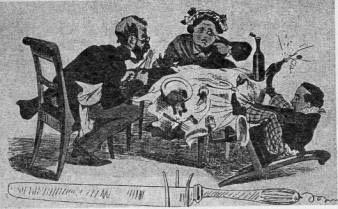
And if Pauline or Petrushka, or some restless Katya did not obey parental instructions, the old children's literature offered them the following examples. That "Prestrashnaya story of matches" ("Stepan-Rastrepka." Stories for Children. - St. Petersburg-Moscow edition of the Partnership MO Wolf, allowed censor March 9, 1901):
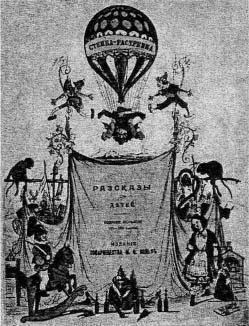
Was part is time,
They've gone all the yard;
At home, Katya one,
She sings and jumps she
By rooms, like a dragonfly.
Suddenly the box in her eyes.
What a nice toy!
She said to herself spinner.
She opened the drawer, matches it.
Come on, Mom, they will light ...
Oh, Kate, matches do not you touch me!
Suddenly dress grabbed the fire:
Steady hand, foot, spit
And on the head hair;
Fire agile fellow -
Off All Kate finally ...
Burned poor it,
Ash was left alone ....
And here is the sad story of the icicle:
Look, Peter, I must
Go immediately to the court,
And you, my friend, I promise,
As long as I get home, have a share,
As a good child, play,
Far from the finger does not suck,
And that's just come tailor
With large pair of scissors, angry,
And fingers you he suddenly
Cut off from both hands. -
As soon as the mother of the gate,
And Peter - OPs! And the finger in his mouth.
Creek Krak! Suddenly the door opened,
Taylor flew like a wild beast;
By Petrusha ran, and - snip!
He snapped his fingers at the moment.
Screams Petrushka: ah, ah, ah!
At other times listen to you know!
Comes mama home;
Oh, my God! Shame what!
Worth icicle in tears,
There is no more fingers.
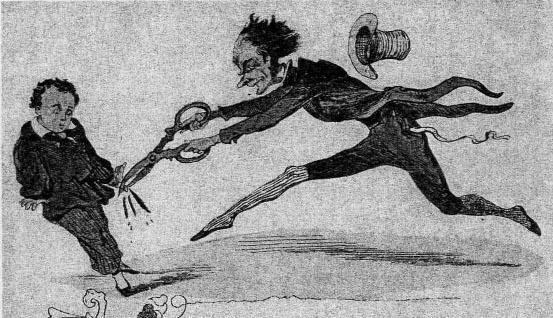
As rightly pointed Roots Chukovsky in his book "Two to five" children's poetry in the old days was purely utilitarian. Here is an example of folk woodcut agitation of the last century (Reader in children's literature: Volume 1. M., 1940): Look back, Horned,
What kind of stuffed it go,
That Prunus mahaleb and Filatka
All alone as the walls go.
They are all the girls run away,
The dances are not allowed.
Do not worry because you have,
Have been used, we as well as you,
We have our fathers ruined,
Vaccinia is not planted.
As the alluvial attacked,
And faces we plowed. Since we came to infectious diseases, here's the problem for the algebra of the "Assembly of algebraic problems", compiled by E. Przewalski teacher 3rd war of Alexander School (published in 1881; Department of Seven: the problem on proportions and progression, № 137)
Ship with 175 passengers out to sea, taking with him fresh water on the entire journey. But, through 30 days after the publication of the sea, opened on the ship's disease, by which died every day for 3 people; also due to the storm, the ship was late arriving in the designated port for 3 weeks; a portion of the water given by each passenger, was not reduced. The question is: how long relied on a journey, and how many passengers arrived at the port?
Answer: 79 days; 28 people. With a special poignancy to the murder in children's literature indicated in the 30s, when the forces of global fascism quadrupled efforts to undermine from within and outside of our socialist fatherland.
Remember, it describes the difficult years of the writer Gy. Adams's novel "The Secret of Two Oceans" on the example of the construction of the submarine "Pioneer" Enemies from the East and the West to exert every effort, spending huge amounts of money, only to discover the secret of the Soviet Navy. Around the plant, which was under construction, day and night, circling spies; two responsible employees of the plant were found dead; spies caught, imprisoned, some for murder shot. But their number is not decreasing, and the audacity of approaching deadlines construction increased ... Intrigue enemy knew neither rest nor borders. Here is a little story of the famous writer Leo Kassil "Uncle Kolya, flycatcher," published in 1938 in Detizdate and since then for some reason not reprinted. The plot is brilliantly simple. Podmoskovny holiday village. The boys, Vadka and Laric held here their summer holidays. Father Larikov known nationwide engineer for negligence holds important secret blueprints at his dacha. Made his way from overseas spy settles nearby, pretending muholovom naturalist and enters the credibility Larikov. And one day, when the boy's father went to the city and Laric left alone.
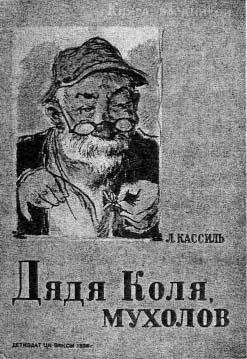
They went to the bathroom. Uncle Nick opened the tap. Larikov seemed that the water at this time flows like a deliberately slow. He could not wait much rather see a bug-water beetles, which brought Uncle Kolya. When the bath was filled with Uncle Kolya released into the water of the promised water beetles. Beetle was really giant. Huge, like a tortoise, he swam, moving his hairy legs. "You Blow on it" - said Uncle Nick. Laric leaned over the side of the bath and almost touching his lips water began to blow on the beetle. And suddenly soft hands Uncle Kolya, became unusually harsh and angry, grabbed him by the shoulder and neck and abruptly shoved into the water. Laric wanted to scream, the water reached into his nose and mouth. He began to beat, choke ... "Zo ist Besser - said flycatcher in German - that's better."
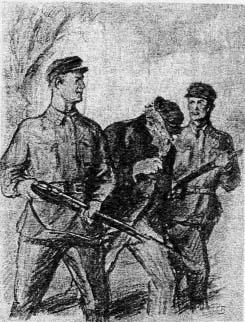
In "The Secret of Two Oceans" Japanese spy Gorelov also trying to drown the Soviet pioneer. But in the novel by Alexander Popkov "The mystery of the blue glass" (Krasnoyarsk, 1955) the enemy has more than sophisticated. The action takes place in Siberia in a small mine one village. Woman spy trying to poison pioneer Kolya using poisonous candy. Here's how it tells itself the young hero: I see, standing on the porch of a woman young and beautiful. Blouse on her silk, green-green, and in the hands of the yellow bag. Should all looks around as if to wait for someone or someone is listening ... she said the water came into the house, and so carefully looked around the kitchen and bathroom. Then he asked me not to call you today to us someone from the mine? I said that we have long since no one was there, and my grandfather went into the forest. Then she pulled out of her purse two candy in colored paper and gave me. "This - he says - in the evening, as the grandfather returns, tea will be one he eat and the other grandfather forbid, let him try!" She smiled and left, and I was something so frightened ...
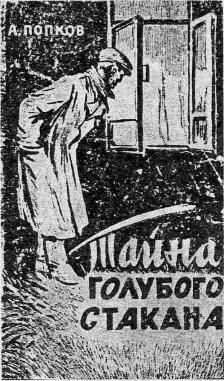
Infants enemy agents usually suffocate with gas. Here's a scene from the book of Romanian writer Haralamba Zinke "Object 112", published in the famous voenizdatovskoy series of novels, "the oblique stripe" in 1958.
Spies and his assistant, penetrated into the house of a prominent Romanian engineer, pretending housekeeper, euthanized last to make casts of the keys to the secret facility.
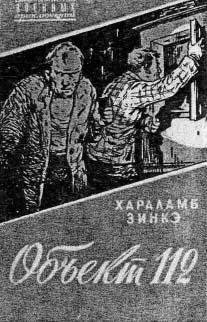
Suddenly, in the next room heard a baby crying ... A woman walked into the next room. She tried to calm the child, but he continued to cry. Then Greta took the baby in his arms and went with him to the kitchen. Approached the child to a gas stove, she turned her faucet. There was a slight noise escaping gas. For a few seconds the housekeeper kept the children's heads above the hob eel, baby stopped. Mueller took it into the room, laid on the bed and covered with a blanket. But how experienced spies check new connected. Open the book Tatyana Sytin "The End of the Big Julius" (Military Publishing, 1956, the same series of "the oblique stripe"). Go to page 160 and further:
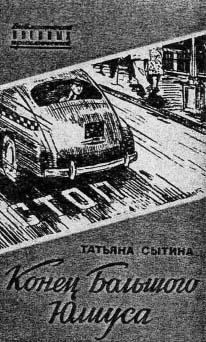
Zakharov was still silent. The little boy about five years old appeared in the alley. Barefoot, in gray pants, hold on one to help, he was busily trotting, waving a large tin can on a wire bow. He was in a hurry for some their important business. "Hey!" - Lazily I called him Gorelli. The boy stopped and, without interrupting his occupation, stared at Gorelli and Zakharov. "You want candy?" - Asked Gorelli and smiled. "Come on!" - Graciously agreed boy, left the track and trotted to Gorelli. Gorelli stepped out to meet him, and when they became friends, he threw out a leg and toe has hit the boy in the ribs. Thunder, rolling away, bank. The boy screamed. Stunned by the blow, he was lying on his back, thin breast it hard to rise and fall with each breath the skin tightly stretched across the ribs. Gorelli looked Zakharov and his eyes on the captain's face, stepped up to the boy. "Back! - Drastically said Zakharov. - Do not touch the baby! .. "Somehow particularly cruel enemy agents show it to the children. Perhaps such a shock therapy, they force themselves to forget what had once been children. Here the story of writer Kim Selihova "It happened at the sea" (M .: Children's Books, 1978). The plot unfolds in a camp on the shore of the Black Sea. Here, together with Soviet pioneers resting boy Juan, whose father is languishing on the island of Tears in the dungeons of some South American junta. Father tried to "fire and water, electricity and a stick", but persistent revolutionary silent. "He must speak! - Require supervision. - From its recognition depends on the security of the junta! "And then the young spy Hilda (aka Agent BoA), passing the island of Tears spy practice offers a cunning plan: steal from the summer camp the son of a revolutionary.
- It's great, BoA! - I praised her boss. - Bring here this red bastard. The junta will not spare money for such an operation. We will torture him in front of his father. This he would not survive!
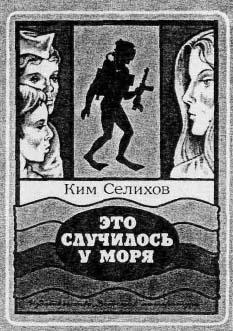
If we are young, budding spies behave badly, then what to talk about their teachers and mentors.
The story of Mikhail Prokofiev's "In Search of" Belladonna & quot; »(Orel Publishing House, 1958) ... At this time, in the farthest office puny old man with the little rat-faced, and then wiping with a tissue festering eyes, said sitting in front of him Biron:" So Sir, what's your ... I forget everything, your methods are disappearing. A knife in the back, shot in the face - the old, wicked ways. A lot of noise is dangerous, and blood ... Ugh, how disgusting, to be stained with the blood of a living creature - man disgust winced. - No, it is necessary to operate quietly - he rose from his seat, rubbing his little withered pen, went to the cupboard, took out two bottles filled one - yellow, and the other - a greenish liquid. Then, giggling, looked at Biron. - That this liquid I can kill thousands of lives, and quickly, without noise, without fuss. Death comes almost instantly from heart failure. Just a few drops in a glass of water - and the person does not! »
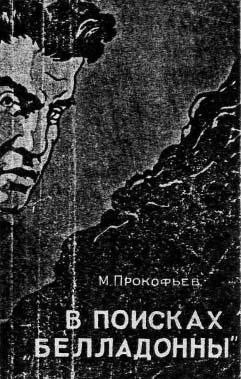
Sometimes, though rarely, enemy agents themselves disguised as children.
Such a case is described in for lead R.Fraermana "Spy" (Detizdat of the Komsomol, 1937) .On larch, at the very top of it, was a man ... Nervously, T-Suevi called Sizov: "Look! Not the boy whether this is "home lazy Death"? After all, only he knows so well climb trees. " And beckoned Sizov hand ... Larch could see well. Someone sat on it, just leaning against the thick branch. Yes, it was a boy in a blue hurme. Sizov second or two staring at his face, then looked down at the shoulders, arms, thin as the legs spider, and suddenly froze. The man drew, then dropping, then lifting his head from the papers lying on his knee. "Spy!" - Flashed suddenly Sizov guess.
Posted in [mergetime] 1235208068 [/ mergetime]
And then, after a two-page chase scene:
Man lying on its side. His eyes were closed, his head cracked stone and blue hurma torn in many places. He was breathing heavily. "Do not touch him!
- And what for?
Source:
knocking fractional knock mouth ...
L. Charskaya. White cape, Ch. XIX
- No! - Said the boy.
- Though you with an ax, but I'm not afraid of you ...
Chukovski. Dr. Aibolit
First, you need an explanation: for children's literature is meant here is not only literature art, it may be folk tales, children and okolodetsky folklore, textbooks, biographies of famous people, in short, everything that seemed suitable to illustrate the title. Sometimes it's even things not for children, but only visited the children - for example, spy books 30- 50s. The mosaic nature of statements and their disorderly arrangement only say that the author of this article does not care about the scientific approach and any moralizing calculations, the main for him care - is to entertain the reader. I'll start, perhaps, from the depths of the dense jungle folk tales with Verlioki and One-Eye Lehigh these Russian relatives famous Greek Cyclops.
Everyone was Verlioka good - and hooked nose and his head erect, and his mustache in polarshina and color bristle, and on one leg - a wooden boot. The only bad thing: by nature he was too weak - both envy where the person who does not restrain himself and the will beat. And so it was with his granddaughter, an orphan, who sent my grandfather to protect the field peas. I saw her Verlioka immediately and killed a crutch. And then sister killed her, followed by sister and grandmother. Comes grandfather for peas, looks: are his beloved granddaughter - just asleep; Only the blood of one, a purple ribbon on his forehead visible, and the other on a white neck five blue fingers ottisnulis. And the old woman so mutilated that know you can not. With dashing the One-eyed things turned even bloodier.
Here poslushayte.Odin blacksmith of boredom and a good life went to look dashing. Or, as they say, for adventure on his head. On the track, he, as usual, a good drink in comrades took myself a tailor, and together they turned the forest. Suddenly see: in the forest hut - bad such a hut, empty; they sat down to myself and wait, and then wait - and do not know. Well, wait - is included in the hut a woman, tall, thin, with one eye, rubbing his hands and says, well done, says complained to me now than dinner. Those, of course, scared, and famously went into the woods, brought firewood, lit the stove, stabbed poor tailor, put the body in the stove, fried and dinner human flesh. Smith was the guy does not miss, the cunning of his eaten friend. He promised villain forge new eyes, instead of the absent, and he took an awl, glowed with fire, guided by eye healthy, took an ax da butt and vdaril of sila. Then almost exactly repeats the story of Odysseus and sheep: dressed in sheep's clothing, a blacksmith is selected from the hut. But this dangerous adventure does not end. There is a blacksmith on the forest path and sees the tree ax with a gold handle. He took over the ax, the arm to him and stuck. A dashing one-eyed right there. Then Smith took out his knife and let his hand cut - sawed off her and left. What is most striking in folk tales, so is the simplicity and ordinariness accompanying bloody scenes. The naivete with which they are described, bordered by some kind of childlike innocence peculiar to primitive peoples. Here's a story about eaten Chinese recorded in the beginning of the century Papuan tribe Marinda-Anime: We were in the village was one Chinese. It was a very bad man, crocodile, anemia and abuser of women. He threatened us his gun and said: "If you do not give me enough coconuts, I all of you shoot." We brought him as much as he wanted. Chinese happy and truly thought he could take us all that we wish. And since he was a bad man, then grabbed her arm a girl and wanted to take her with him. But this girl was his father and his father's brother, and a cousin, and another young man who was going to
marry her. All of them came with their club and knocked him on the head. Then he fell to the ground and died. We are surrounded on all sides for a long time discussing what to do. Suddenly, an old man looked at the sky and said, "When you kill him, the sun was there, and now it is here. If you have not finished talking to his call, the Chinese no longer be there: he starts to stink. " Then we cut it into pieces, finely cut meat, and women have baked it with sago flour. A Chinese man was extremely tasty, where tastier ordinary person and a lot tastier than the pig. And here is a story that happened in the Pamirs:
Jura lay prone and something appetizing to eat. Anger Side choked. He clearly imagined Jura takes out hiding place meat and cakes and secretly eats, do not share with him. "Aha! Aha! "- Desperately cried Side, crawling on all fours to the Jura. Slipping his hand under the Loch motya he clutched Djourou hair and jerks threw his head back. "He nibbles ... own hand!" _ Whispered in horror Said. Russia, XVIII century, "Courtesy, presented in the prints", translated from French, picture books for young children, a chapter entitled "There should not lean on the table»
"Paulina, - said once Mrs. Marzal his six-year daughter - if I have when I see that you are leaning on the table, I will send you to dine in the kitchen. I told you repeatedly said that to the table, you can touch one hand only. " - "I - picked Mr Marzal - remind her not the first time that should never throw the bones and crumbs on the floor, but put them on the edge of the plate. Not ashamed to fill because the mouth as you are now; one must wait ahead when swallow what you have in your mouth and wipe napkin mouth before you start drinking ... Paulina has a lot of other errors of this sort: she kept playing his fork and spoon. Zavyaznet there anything between the teeth, it starts to dig his fingers, the tip of a knife or a pin, why can themselves be subjected to harm ... »

And if Pauline or Petrushka, or some restless Katya did not obey parental instructions, the old children's literature offered them the following examples. That "Prestrashnaya story of matches" ("Stepan-Rastrepka." Stories for Children. - St. Petersburg-Moscow edition of the Partnership MO Wolf, allowed censor March 9, 1901):

Was part is time,
They've gone all the yard;
At home, Katya one,
She sings and jumps she
By rooms, like a dragonfly.
Suddenly the box in her eyes.
What a nice toy!
She said to herself spinner.
She opened the drawer, matches it.
Come on, Mom, they will light ...
Oh, Kate, matches do not you touch me!
Suddenly dress grabbed the fire:
Steady hand, foot, spit
And on the head hair;
Fire agile fellow -
Off All Kate finally ...
Burned poor it,
Ash was left alone ....
And here is the sad story of the icicle:
Look, Peter, I must
Go immediately to the court,
And you, my friend, I promise,
As long as I get home, have a share,
As a good child, play,
Far from the finger does not suck,
And that's just come tailor
With large pair of scissors, angry,
And fingers you he suddenly
Cut off from both hands. -
As soon as the mother of the gate,
And Peter - OPs! And the finger in his mouth.
Creek Krak! Suddenly the door opened,
Taylor flew like a wild beast;
By Petrusha ran, and - snip!
He snapped his fingers at the moment.
Screams Petrushka: ah, ah, ah!
At other times listen to you know!
Comes mama home;
Oh, my God! Shame what!
Worth icicle in tears,
There is no more fingers.

As rightly pointed Roots Chukovsky in his book "Two to five" children's poetry in the old days was purely utilitarian. Here is an example of folk woodcut agitation of the last century (Reader in children's literature: Volume 1. M., 1940): Look back, Horned,
What kind of stuffed it go,
That Prunus mahaleb and Filatka
All alone as the walls go.
They are all the girls run away,
The dances are not allowed.
Do not worry because you have,
Have been used, we as well as you,
We have our fathers ruined,
Vaccinia is not planted.
As the alluvial attacked,
And faces we plowed. Since we came to infectious diseases, here's the problem for the algebra of the "Assembly of algebraic problems", compiled by E. Przewalski teacher 3rd war of Alexander School (published in 1881; Department of Seven: the problem on proportions and progression, № 137)
Ship with 175 passengers out to sea, taking with him fresh water on the entire journey. But, through 30 days after the publication of the sea, opened on the ship's disease, by which died every day for 3 people; also due to the storm, the ship was late arriving in the designated port for 3 weeks; a portion of the water given by each passenger, was not reduced. The question is: how long relied on a journey, and how many passengers arrived at the port?
Answer: 79 days; 28 people. With a special poignancy to the murder in children's literature indicated in the 30s, when the forces of global fascism quadrupled efforts to undermine from within and outside of our socialist fatherland.
Remember, it describes the difficult years of the writer Gy. Adams's novel "The Secret of Two Oceans" on the example of the construction of the submarine "Pioneer" Enemies from the East and the West to exert every effort, spending huge amounts of money, only to discover the secret of the Soviet Navy. Around the plant, which was under construction, day and night, circling spies; two responsible employees of the plant were found dead; spies caught, imprisoned, some for murder shot. But their number is not decreasing, and the audacity of approaching deadlines construction increased ... Intrigue enemy knew neither rest nor borders. Here is a little story of the famous writer Leo Kassil "Uncle Kolya, flycatcher," published in 1938 in Detizdate and since then for some reason not reprinted. The plot is brilliantly simple. Podmoskovny holiday village. The boys, Vadka and Laric held here their summer holidays. Father Larikov known nationwide engineer for negligence holds important secret blueprints at his dacha. Made his way from overseas spy settles nearby, pretending muholovom naturalist and enters the credibility Larikov. And one day, when the boy's father went to the city and Laric left alone.

They went to the bathroom. Uncle Nick opened the tap. Larikov seemed that the water at this time flows like a deliberately slow. He could not wait much rather see a bug-water beetles, which brought Uncle Kolya. When the bath was filled with Uncle Kolya released into the water of the promised water beetles. Beetle was really giant. Huge, like a tortoise, he swam, moving his hairy legs. "You Blow on it" - said Uncle Nick. Laric leaned over the side of the bath and almost touching his lips water began to blow on the beetle. And suddenly soft hands Uncle Kolya, became unusually harsh and angry, grabbed him by the shoulder and neck and abruptly shoved into the water. Laric wanted to scream, the water reached into his nose and mouth. He began to beat, choke ... "Zo ist Besser - said flycatcher in German - that's better."

In "The Secret of Two Oceans" Japanese spy Gorelov also trying to drown the Soviet pioneer. But in the novel by Alexander Popkov "The mystery of the blue glass" (Krasnoyarsk, 1955) the enemy has more than sophisticated. The action takes place in Siberia in a small mine one village. Woman spy trying to poison pioneer Kolya using poisonous candy. Here's how it tells itself the young hero: I see, standing on the porch of a woman young and beautiful. Blouse on her silk, green-green, and in the hands of the yellow bag. Should all looks around as if to wait for someone or someone is listening ... she said the water came into the house, and so carefully looked around the kitchen and bathroom. Then he asked me not to call you today to us someone from the mine? I said that we have long since no one was there, and my grandfather went into the forest. Then she pulled out of her purse two candy in colored paper and gave me. "This - he says - in the evening, as the grandfather returns, tea will be one he eat and the other grandfather forbid, let him try!" She smiled and left, and I was something so frightened ...

Infants enemy agents usually suffocate with gas. Here's a scene from the book of Romanian writer Haralamba Zinke "Object 112", published in the famous voenizdatovskoy series of novels, "the oblique stripe" in 1958.
Spies and his assistant, penetrated into the house of a prominent Romanian engineer, pretending housekeeper, euthanized last to make casts of the keys to the secret facility.

Suddenly, in the next room heard a baby crying ... A woman walked into the next room. She tried to calm the child, but he continued to cry. Then Greta took the baby in his arms and went with him to the kitchen. Approached the child to a gas stove, she turned her faucet. There was a slight noise escaping gas. For a few seconds the housekeeper kept the children's heads above the hob eel, baby stopped. Mueller took it into the room, laid on the bed and covered with a blanket. But how experienced spies check new connected. Open the book Tatyana Sytin "The End of the Big Julius" (Military Publishing, 1956, the same series of "the oblique stripe"). Go to page 160 and further:

Zakharov was still silent. The little boy about five years old appeared in the alley. Barefoot, in gray pants, hold on one to help, he was busily trotting, waving a large tin can on a wire bow. He was in a hurry for some their important business. "Hey!" - Lazily I called him Gorelli. The boy stopped and, without interrupting his occupation, stared at Gorelli and Zakharov. "You want candy?" - Asked Gorelli and smiled. "Come on!" - Graciously agreed boy, left the track and trotted to Gorelli. Gorelli stepped out to meet him, and when they became friends, he threw out a leg and toe has hit the boy in the ribs. Thunder, rolling away, bank. The boy screamed. Stunned by the blow, he was lying on his back, thin breast it hard to rise and fall with each breath the skin tightly stretched across the ribs. Gorelli looked Zakharov and his eyes on the captain's face, stepped up to the boy. "Back! - Drastically said Zakharov. - Do not touch the baby! .. "Somehow particularly cruel enemy agents show it to the children. Perhaps such a shock therapy, they force themselves to forget what had once been children. Here the story of writer Kim Selihova "It happened at the sea" (M .: Children's Books, 1978). The plot unfolds in a camp on the shore of the Black Sea. Here, together with Soviet pioneers resting boy Juan, whose father is languishing on the island of Tears in the dungeons of some South American junta. Father tried to "fire and water, electricity and a stick", but persistent revolutionary silent. "He must speak! - Require supervision. - From its recognition depends on the security of the junta! "And then the young spy Hilda (aka Agent BoA), passing the island of Tears spy practice offers a cunning plan: steal from the summer camp the son of a revolutionary.
- It's great, BoA! - I praised her boss. - Bring here this red bastard. The junta will not spare money for such an operation. We will torture him in front of his father. This he would not survive!

If we are young, budding spies behave badly, then what to talk about their teachers and mentors.
The story of Mikhail Prokofiev's "In Search of" Belladonna & quot; »(Orel Publishing House, 1958) ... At this time, in the farthest office puny old man with the little rat-faced, and then wiping with a tissue festering eyes, said sitting in front of him Biron:" So Sir, what's your ... I forget everything, your methods are disappearing. A knife in the back, shot in the face - the old, wicked ways. A lot of noise is dangerous, and blood ... Ugh, how disgusting, to be stained with the blood of a living creature - man disgust winced. - No, it is necessary to operate quietly - he rose from his seat, rubbing his little withered pen, went to the cupboard, took out two bottles filled one - yellow, and the other - a greenish liquid. Then, giggling, looked at Biron. - That this liquid I can kill thousands of lives, and quickly, without noise, without fuss. Death comes almost instantly from heart failure. Just a few drops in a glass of water - and the person does not! »

Sometimes, though rarely, enemy agents themselves disguised as children.
Such a case is described in for lead R.Fraermana "Spy" (Detizdat of the Komsomol, 1937) .On larch, at the very top of it, was a man ... Nervously, T-Suevi called Sizov: "Look! Not the boy whether this is "home lazy Death"? After all, only he knows so well climb trees. " And beckoned Sizov hand ... Larch could see well. Someone sat on it, just leaning against the thick branch. Yes, it was a boy in a blue hurme. Sizov second or two staring at his face, then looked down at the shoulders, arms, thin as the legs spider, and suddenly froze. The man drew, then dropping, then lifting his head from the papers lying on his knee. "Spy!" - Flashed suddenly Sizov guess.
Posted in [mergetime] 1235208068 [/ mergetime]
And then, after a two-page chase scene:
Man lying on its side. His eyes were closed, his head cracked stone and blue hurma torn in many places. He was breathing heavily. "Do not touch him!
- And what for?
Source:










